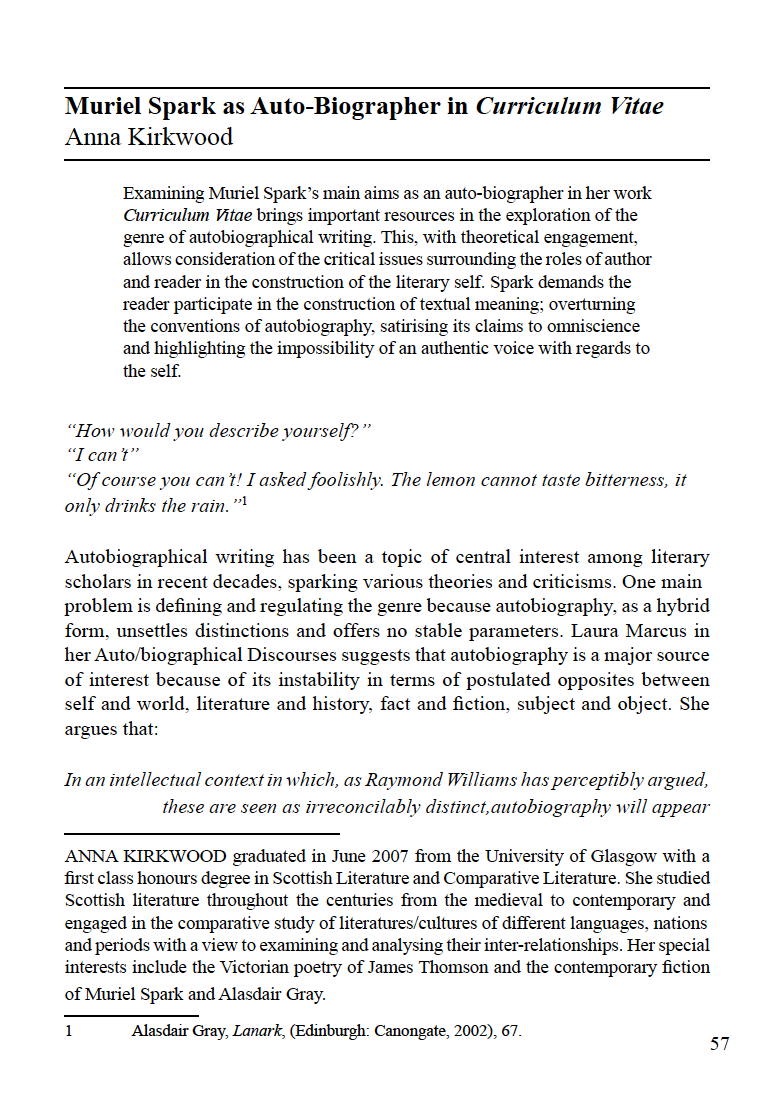Muriel Spark as Auto-Biographer in Curriculum Vitae
DOI:
https://doi.org/10.36399/GroundingsUG.1.275Keywords:
Muriel Spark, Autobiography, Curriculum Vitae, Self, Literary Theory, Textual Meaning, Conventions, Satire, VoiceAbstract
Examining Muriel Spark’s main aims as an auto-biographer in her work Curriculum Vitae brings important resources in the exploration of the genre of autobiographical writing. This, with theoretical engagement, allows consideration of the critical issues surrounding the roles of author and reader in the construction of the literary self. Spark demands the reader participate in the construction of textual meaning; overturning the conventions of autobiography, satirising its claims to omniscience and highlighting the impossibility of an authentic voice with regards to the self.
References
Barry, Peter. Beginning Theory. Manchester: Manchester University Press,2002.
Barthes, Roland. “‘The Death of the Author’, Image-Music-Text.” Translated and edited by Stephen Heath. London: Fontana, 1977.
Burke, Seàn. The Death and Return of the Author. Edinburgh: Edinburgh University Press, 1998.
Gray, Alasdair. Lanark. Edinburgh: Canongate, 2002.
Litvack, Leon. “‘We all have something to hide’: Muriel Spark, Autobiography, and the Influence of Newman on the Career of a Novelist.” Durham University Journal 55:2 (1994): 281-9.
Marcus, Laura. Auto/biographical Discourses: Theory, criticism, practice. Manchester: Manchester University Press, 1994.
McQuillan, Martin. “‘The Same Informed Air’: an Interview with Muriel Spark.” In Theorizing Muriel Spark. Edited by Martin McQuillan, 210-229. Houndsmill, Baskingstoke, UK: Palgrave, 2002.
Nietzsche, Friedrich. Ecce Homo. London: Penguin, 2004.
Spark, Muriel. Loitering with Intent. New York: Coward, McCann & Geoghegan, 1981.
Spark, Muriel. “The Desegregation of Art.” In Critical Essays on Muriel Spark. Edited by Joseph Hynes, 33-37. New York: G.K. Hall, 1992.
Spark, Muriel. Curriculum Vitae: A Volume of Autobiography. London: Penguin, 1993.
Sproxton, Judy. The Women of Muriel Spark. London: Constable, 1992.
Svevo, Italo. Zeno’s Conscience. London: Penguin, 2002.
Todorov, Tzvetan. Mikhail Bakhtin: The Dialogic Principle. Translated by Wlad Godzich. Manchester: Manchester University Press, 1984.

Downloads
Published
Issue
Section
License
Copyright (c) 2007 Anna Kirkwood

This work is licensed under a Creative Commons Attribution 4.0 International License.
The CC BY 4.0 license is a Creative Commons license. This is a non-copyleft free license that is good for art and entertainment works, and educational works. It is compatible with all versions of the GNU GPL; however, like all CC licenses, it should not be used on software. People are free to: Share — copy and redistribute the material in any medium or format; Adapt — remix, transform, and build upon the material for any purpose, even commercially. The licensor cannot revoke these freedoms as long as you follow the license terms. But they must conform to the following terms: Attribution — You must give appropriate credit, provide a link to the license, and indicate if changes were made. You may do so in any reasonable manner, but not in any way that suggests the licensor endorses you or your use. No additional restrictions — You may not apply legal terms or technological measures that legally restrict others from doing anything the license permits.
Please check individual article PDF copies to see if any additional restrictions apply.







